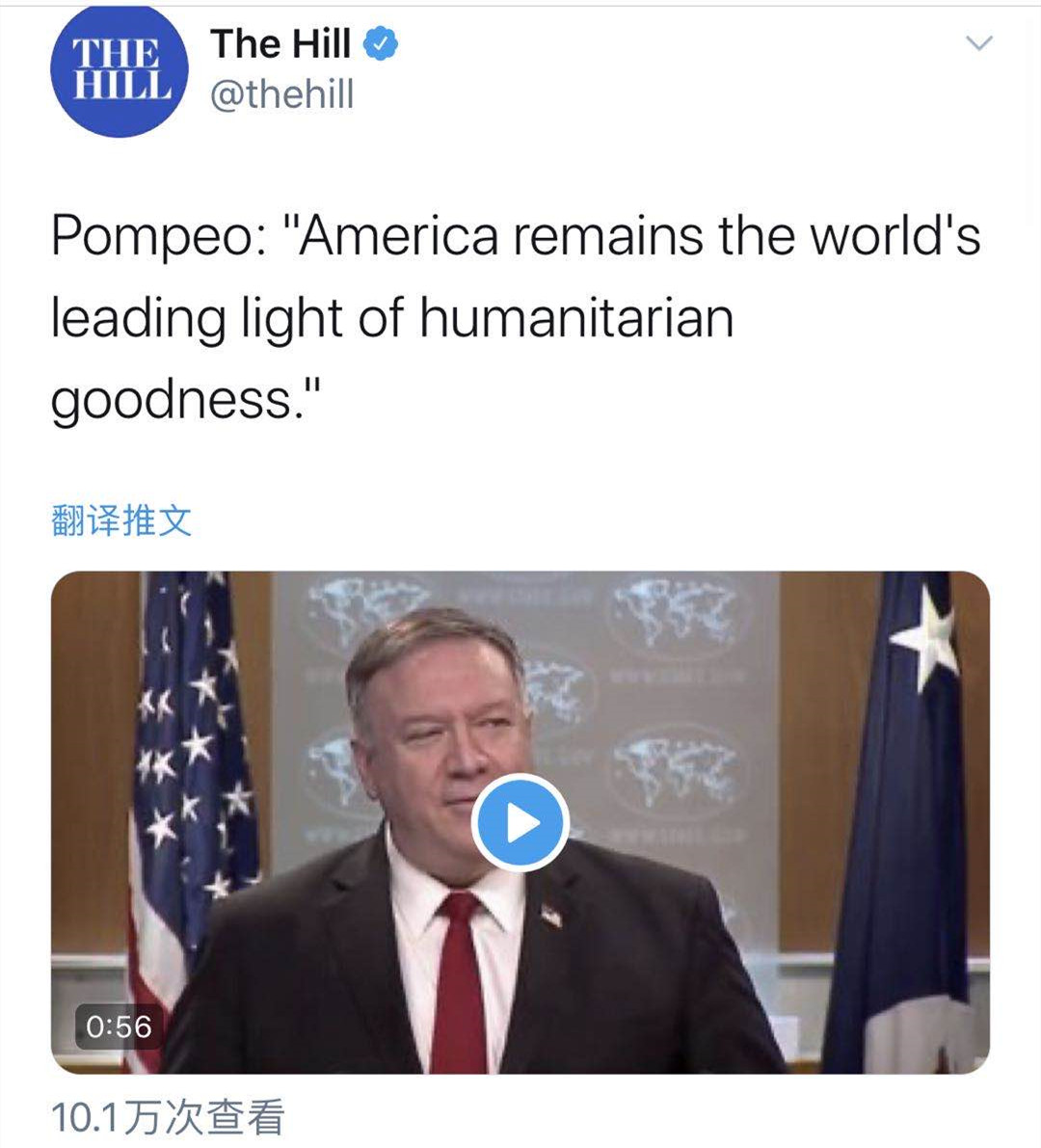

In a bid to salvage America’s reputation amid the pneumonia outbreak, U.S. Secretary of State Mike Pompeo boasted at a news conference that “America remains the world’s leading light of humanitarian goodness” on April 8.

His remarks were met with strong opposition from netizens. “How do you sleep at night when you spread such lies?” refuted Twitter user Judy Voting Blue, commenting "What do you call a person that withholds equipment to anyone but "friends" in his own country! Not human."
In celebration of World Health Day that falls on April 7, Tedros Adhanom Ghebreyesus, Director-General of the World Health Organization (WHO), tweeted a picture with dozens of applause emojis to thank the heroes working in the health care sector during the epidemic.
On April 7, however, U.S. President Donald Trump criticized the WHO as being slow to respond to the crisis, accused it of being “China-centric” and threatened to freeze funding for the UN agency.

In fact, the WHO issued a warning over the novel coronavirus at the beginning of the crisis, declaring a Public Health Emergency of International Concern on January 30. Although the Secretary of the U.S. Department of Health and Human Services declared a public health emergency in the country one day later, it would be several weeks before Trump declared a national emergency.
Obviously, the U.S. is now making the WHO a scapegoat for its own incompetence in handling the pneumonia outbreak. As the deadly virus continues to rage all over the world, it has threatened to withdraw financial support for the WHO, an important health institution, on World Health Day, a day when people are supposed to express their respect to medical workers who are doing their best to save lives. Isn’t this ironic coming from the country that claims to be “the world’s leading light of humanitarian goodness?”
The U.S. will bully anyone who refuses to follow the path it sets, and the WHO is a classic deflection of attention over how badly America is handling the crisis, some netizens said.
The epidemic is actually a humanitarian crisis, but the U.S. is holding back the global fight against it. Firstly, it refuses to end sanctions against Cuba, Iran and Venezuela, which could weaken their medical systems and undermine their attempts to defeat the epidemic. On top of that, it has not provided any aid to its allies in Europe and even imposed a unilateral ban on European travelers.
Some American politicians should realize that real humanitarianism is about putting people’s lives first, empathizing with other countries without ideological prejudice, and working with each other in times of need.
 Fire brigade in Shanghai holds group wedding
Fire brigade in Shanghai holds group wedding Tourists enjoy ice sculptures in Datan Town, north China
Tourists enjoy ice sculptures in Datan Town, north China Sunset scenery of Dayan Pagoda in Xi'an
Sunset scenery of Dayan Pagoda in Xi'an Tourists have fun at scenic spot in Nanlong Town, NW China
Tourists have fun at scenic spot in Nanlong Town, NW China Harbin attracts tourists by making best use of ice in winter
Harbin attracts tourists by making best use of ice in winter In pics: FIS Alpine Ski Women's World Cup Slalom
In pics: FIS Alpine Ski Women's World Cup Slalom Black-necked cranes rest at reservoir in Lhunzhub County, Lhasa
Black-necked cranes rest at reservoir in Lhunzhub County, Lhasa China's FAST telescope will be available to foreign scientists in April
China's FAST telescope will be available to foreign scientists in April "She power" plays indispensable role in poverty alleviation
"She power" plays indispensable role in poverty alleviation Top 10 world news events of People's Daily in 2020
Top 10 world news events of People's Daily in 2020 Top 10 China news events of People's Daily in 2020
Top 10 China news events of People's Daily in 2020 Top 10 media buzzwords of 2020
Top 10 media buzzwords of 2020 Year-ender:10 major tourism stories of 2020
Year-ender:10 major tourism stories of 2020 No interference in Venezuelan issues
No interference in Venezuelan issues
 Biz prepares for trade spat
Biz prepares for trade spat
 Broadcasting Continent
Broadcasting Continent Australia wins Chinese CEOs as US loses
Australia wins Chinese CEOs as US loses